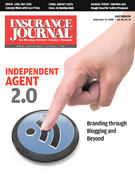Despite current market conditions, as I travel from state to state, I find the goal of almost every independent agent is to grow personal lines business. The basis of this organic growth strategy is adding new clients or increasing the amount of business agencies already have with existing clients. To realize this type of growth, agencies need a plan, a written, document or road map that positions them for long-term profitable growth. However, I find a plan is often missing (although agents readily admit that changes in the market and within the industry dictate that now more than ever agencies must have a plan and be more proactive).
Many agency principals have a vision of what they would like to see happen within their agencies. A strategic growth plan is the tool that will guide them toward achieving their vision.
The first point that I make to our agent business partners is that hope is not a plan. Hope is the element that keeps us going; the plan is what positions the agency for growth.
A solid agency growth plan starts with the agency’s philosophy. What do you want the agency to be? Many independent agents struggle with deciding whether to be a service or sales organization. Another tough decision is whether to be highly automated or less automated. Still others debate if they should limit who and what they write. There is no right or wrong philosophy, but formally establishing the agency’s values will allow the firm to implement the right procedures to support its philosophy and reach its goals. If the procedures don’t support the philosophy, the agency will be hindered in its ability to meet growth goals and objectives.
The philosophy has a direct impact on everything that takes place: what carriers the agency aligns with, what it measures, how it manages staff, job design, how goals are set, how day-to-day tasks are completed, as well as how and for what the agency compensates its staff.
For example, a sales organization compensates differently than a service organization. Again, neither philosophy is better or worse, but how an agency compensates its staff will drive performance toward the agency’s overall objectives.
Once an agency locks down its philosophy, the next step involves a self-assessment to identify where the agency currently stands. I recommend a SWOT analysis, which identifies agency strengths, weaknesses, opportunities and threats.
Some of the strengths I typically see are:
- Reputation in the marketing territory;
- Veteran staff (this could also be a weakness);
- Lead generation sources (realtors, mortgage brokers, spheres of influence);
- Alignment with quality carriers;
- Sales culture; and
- Excellent agency management system (this could also be a weakness).
Some of the typical weaknesses are:
- No growth plan;
- No sales compensation plan;
- Veteran staff (resistant to change);
- Too many carriers;
- No job descriptions;
- Eroding retention;
- Accounts not well-rounded;
- Accounts poorly cross sold (writing PL for CL clients);
- No defined goals;
- No referral strategy; and
- Not taking advantage of agency management system functionality.
After an agency decides on what it means to succeed, it must identify the procedures needed to align its business practices with its overall philosophy.
The most difficult part is determining what success means to the business. When defining success, go beyond profits. Recognize that running a successful organization means setting realistic goals for the business, increasing referrals, losing fewer customers, rounding more accounts, etc., while giving employees the tools and incentives they need to achieve and sustain those objectives well into the future.
Topics Agencies
Was this article valuable?
Here are more articles you may enjoy.


 Florida Engineers: Winds Under 110 mph Simply Do Not Damage Concrete Tiles
Florida Engineers: Winds Under 110 mph Simply Do Not Damage Concrete Tiles  Zurich Insurance Profit Beats Estimates as CEO Eyes Beazley
Zurich Insurance Profit Beats Estimates as CEO Eyes Beazley  State Farm Adjuster’s Opinion Does Not Override Policy Exclusion in MS Sewage Backup
State Farm Adjuster’s Opinion Does Not Override Policy Exclusion in MS Sewage Backup  Viewpoint: Runoff Specialists Have Evolved Into Key Strategic Partners for Insurers
Viewpoint: Runoff Specialists Have Evolved Into Key Strategic Partners for Insurers 


